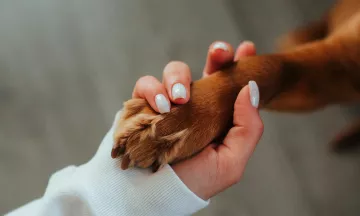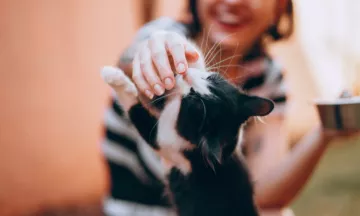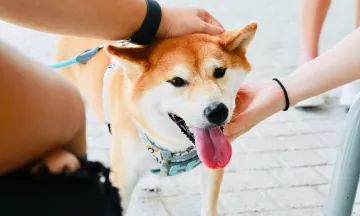Stress, trauma, and pets going missing: fireworks can be very hazardous for animals and can cause a lot of anxiety, at worst, many pets may run away and get lost. Are you a pet owner or a pet sitter? Be sure to take these extra measures to prevent accidents and your pet from going missing.
Fearful dogs can be recognized by their body language: tail between the legs, ears flat, panting, licking their lips, yawning, trembling, walking around nervously, wanting to hide, no attention for food, games, cuddles, etc. Does your dog show any of these signals? Then read these tips carefully to prevent any mishaps during a firework display.
Prevent your pet from going missing
On nights with major fireworks, twice as many pets go missing than on a regular day. So it's important to keep an extra close eye on our furry friends at this time of year, as even the most level-headed dog or cat can show really unpredictable behaviour. Dogs and cats that are normally super calm and confident can suddenly run away or hide out of sheer fear.
Make sure your pet is chipped and tagged. Keep your dog or guest dog on-leash throughout the whole night. And don't ever leave a dog alone in public, such as waiting outside the supermarket, for example. The dog may be frightened by strangers walking past or even worse: by the sounds of loud noises and fireworks. If the dog is left alone and tied up, this can be incredibly traumatic.
Double-check whether the pets in your home are safely inside, then close and lock all windows, doors and cat flaps. Are you a pet sitter and responsible for someone else's pets? Make it a rule to not allow your guest pet to walk off-leash at this time of year. Are you doing drop-in house visits? When leaving or entering the house, always check whether the cat isn't silently slipping through the open door with you. During a home visit, make sure the cat is still in the house so you can send an update to the pet owners for peace of mind. Some cats try to hide in their favourite secret spots. Make sure you know where these are before you start your pet sitting job.
New Year's eve home safety
Close the curtains to keep out the 'scary' fireworks light, but leave doors in your house open so your pets can find their own safe space. You can help your dog or cat by creating a cozy and sheltered spot, preferably near you. Put a cloth over the cage of birds and/or rodents for extra shelter. Turn on the TV or radio to neutralize noise from outside.

Reduce fear of fireworks
First of all: Make sure you have already taken your dog to a quiet park in the afternoon, or plan an extra-long walk before the evening with lots of exercise and mental games. Playing games and exercising with your dog will ensure they are tired and happy in the evening. Be sure to return home no later than 6 pm when many early fireworks might start.
Dogs who are extremely anxious about fireworks can get stuck in a state of stress where their body stiffens. By wrapping your dog in a cloth or a Thundershirt, you can calm them down and help them to feel safe and secure.
Don't ever punish your cat or dog for displaying anxious behaviour, that will only increase insecurity. Try to stay calm yourself, as your confident energy will help make your pet feel safe. Talk to your pet in a calm, encouraging way ('good booooy, you're doing fine') and stay close to make sure they know they are not alone.
Plan ahead for the next big Fireworks
Consider spending December 31 in a firework-free pet-friendly hotel where your pet can celebrate a quiet and peaceful New Year's. Many of these hotels are booked quite early, so make sure to plan ahead.
Do you want to celebrate New Year's Eve with plenty of fun and fireworks, but want to make sure your pet feels safe and sound? Book a Pawshake pet sitter in a quiet, cozy, home environment. Pawshake pet sitters offer home dog boarding during New Year's Eve so your furry friend can enjoy a calm and safe evening.





